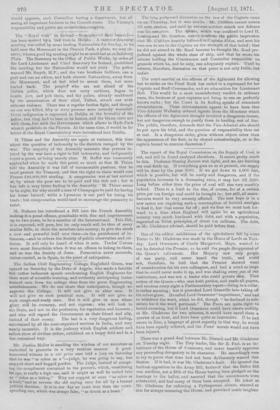The " Royal visit" to Ireland —lo people eqsit their
hemee ?- hue been marred by a bad riot in Ditedin. A monetereAninesty meeting was called by Some leading Nationalists for Saulay, to be held near the Monument in the Phsenix Park, a place, we may ob- serve, wherea good big meeting might be as much lost as on Salisbury Plain, The Secretary to the Office of Public Works, by order,of the Lord-Lieutenant and Chief Secretary for Ireland, prohibited the meeting, but the Nationalists would not yield. The police warned Mr. Smyth, M.P., and the two brothers Sullivan, one a poet and one an editor, and both sincere Nationalists, away from the Monument, and at last tried to arrest them, but were hurled back. The people!' who are not Afraid of the Dublin police, which does not carry carbines, began to hustle, jeer, and pelt them, and the police, already maddened by the assassination of their chief, Talbot, struck out with extreme violence. There was a regular faction fight, and though no one was killed, fifty or sixty persons were severely wounded. Great indignation is expressed in Dublin at the brutality of the police, but they had to beat or be beaten, and the blame rests not with them, but with the Government which allows in Hyde Park what it prohibits in the Phenix. At the same time, it would be far better if the Royal Constabulary were introduced into Dublin.






























 Previous page
Previous page